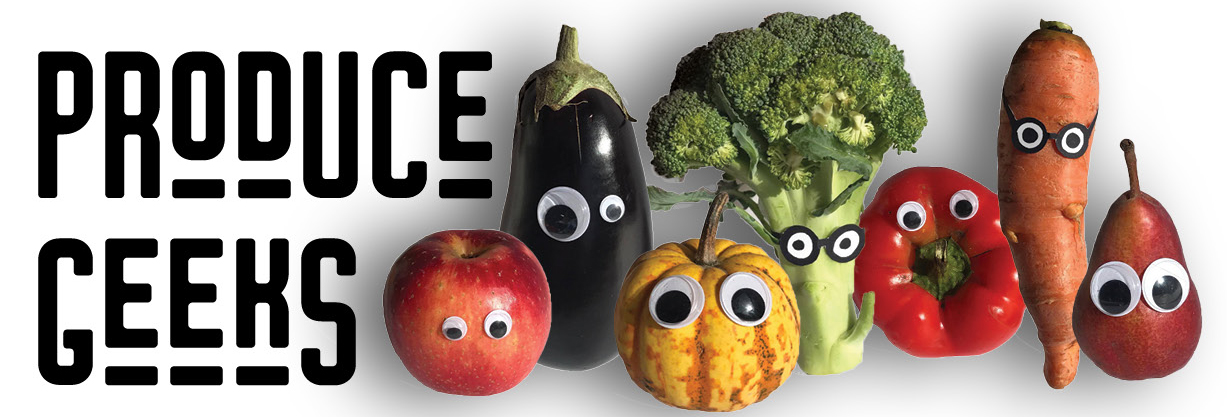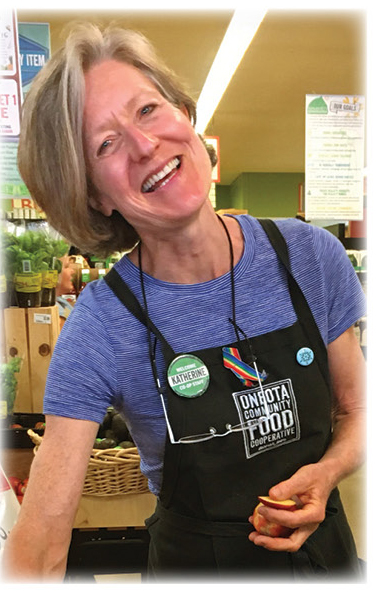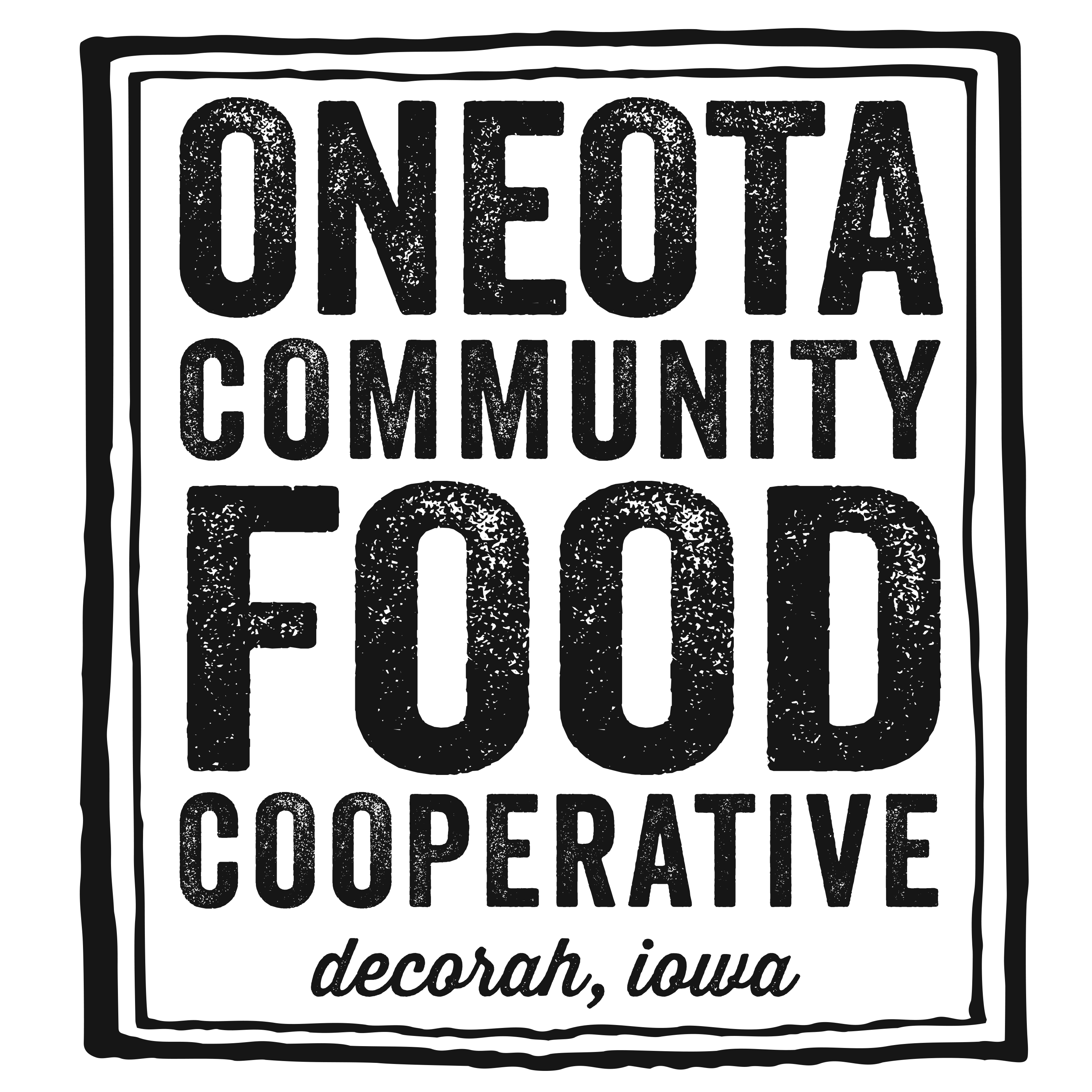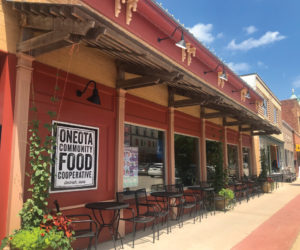
by: Katherine Hannigan, Assistant Produce Manager
Geek /gēk/ n: 2. a person who has excessive enthusiasm for and some expertise about a specialized subject or activity: a foreign-film geek. (from Dictionary.com)
We are geeks. Produce geeks. We sample the fruit when we get it from our distributors. Why? To insure quality, and so we can tell our customers what sort of flavors they can look forward to. When we taste something extraordinary—like the multi-layered lusciousness of a non-heat-treated mango, or the sweet and tangy sassiness of a Starkrimson pear—we get excited. Yes, and some of us make sounds—loud, wordless ones. One colleague emits a noise that’s part scream, part squeal, and a whole lot of “Mmmmm.” It is the most direct expression of happiness I’ve ever heard. It also scares coyotes and feral cats.
We like eliciting similar (but quieter) reactions from our customers. Not much makes me happier than watching the surprise and delight that transforms a customer’s face the first time they try something they didn’t know would be delicious. That’s why I was cutting up slices of Melogold grapefruit and passing them out to anyone who would take them after I first tasted it. Until I met the Melogold, grapefruit had been a lot like homework—it might be good for me, but it was hard to swallow. I even suspected there was some cruelty involved in its creation. But Melogold tastes like angels kissed it, banishing that grapefruit bitterness, leaving pure scrumptiousness. Lots of folks felt the same. We’d be standing in the produce section, smiling and having a small-scale celebration, so happy because we live in a world where humans help grow these things, and then get to eat them. We were reveling in our connectedness.
I’ve said to my colleagues more than once, “There’s a reason produce and party both begin with the letter ‘P’.” They laugh, but they don’t disagree.
We are not simply enthusiasts, though. We bring our intellects to this vocation, too. One Monday, as we discussed the distinct shape and color of Romanesco broccoli, Betsy Peirce, the produce manager, shared, “And its form is a natural approximation of a fractal.” So there. And after delivering the last of the Roma tomatoes for the season, Barb Kraus from Canoe Creek Produce informed me that kiwi berries are the same genus, but not species, as a regular kiwi. Why? Because I asked her. Because I’m a geek.
Betsy shares the Coop Partners Produce Newsletter with us every week, and we read it – because we want to. It’s informative and educational. It tells us which fruits and vegetables are on their way, how they’re grown, how they taste and how to take care of them. The writing is succinct, honest, and enthusiastic—it’s a pleasure to read (for a geek). Here’s an example:
“The spectacular ‘non-hot water treated’ Kent Mangoes are here. These are from growing regions in Mexico that are determined to be free of bugs that the USDA is concerned about, so the fruit does not need to go through the hot water treatment that most import mangoes are subjected to. Truly raw fruit has always been better eating with better texture (and more consistent ripening) than the treated fruit.” (8/14/17)
CPPN gives us ideas and gets us excited. In the October 9th edition of the newsletter, the CCPN authors announced, among other things, that jicama would finally be available from a regional grower. Betsy prefaced her e-mail to us with this message: “LOCAL Jicama!!” as if we should break out the confetti and kazoos. Indeed it was time to start celebrating because it’s a party.
Sometimes, the CPPN folks tell us things we don’t want to hear like there will be no more Melogolds for a while or the price of avocadoes is going up. They offer explanations. We study those remarks a little more specifically partly to soothe our own sadness and to have answers for our customers when they ask, “Why?” The reasons are always matter-of-fact, involving cause and effect like, “Over the last few weeks, Maywood Farms (the premier Fig orchard in the country) has seen unprecedented heat, and then rains…and now they are getting some strong winds. The wind has effectively done in the Kadota harvest.” (10/9/17)
Here are some other notices:
“As you’ve likely heard, there was a huge storm in western Wisconsin last Wednesday night that caused damage to a number of farms…One farm lost a greenhouse and many are reporting damage to fields flattened by rain and wind. The weekend wasn’t much better with another round of storms blowing in Friday night and dumping lots of rain on already soaked fields. Some of the local veggies that were negatively affected and will be short this week include Cilantro, Green Top Radishes, and Dill.” (7/24/17)
“We have a few Sweet Dream Peaches from Washington, but this is probably the last of them. We only got a portion of what we were hoping…they could not pick more as the hot weather and all the smoke from the terrible fires burning nearby made it too hazardous for their crew to get back out in the orchard. Similarly, because of continued rain events in Mexico, very few Avocados were harvested last week… it is very likely that we will run out of everything…before the next harvest comes in… Prices are likely to remain high for the foreseeable future.” (9/11/17)
“The Northwest Blueberry harvest did not produce enough fruit to pack last week, so we are out. There are Blueberries on the vine in California, but the grower could not find enough workers to pick them! So far, we are only seeing sporadic issues like this with labor shortages in the ag world. However, if immigration policies continue in the direction that they are trending towards, the situation is likely to get much worse. This is not just a California farm issue…farms all over the continental US—including many local– are very much dependent on immigrant labor to tend and harvest their crops.” (9/4/17)
And here’s another word that starts with P: Politics. Produce isn’t political. Fruits and vegetables don’t care about NAFTA, or whether we believe in climate change. They don’t care if you voted red, blue, or orange. But politics affects produce because everything’s connected. So, whatever your beliefs are about climate change, we’re seeing growing seasons start late, end early, and crops obliterated by extraordinary climate events like droughts and extreme rains and winds. If relationships between nations get tense or shut down, that affects prices .
.
This P word is not anywhere near as fun as Party; in fact, it kind of puts a damper on it, like Parents and Police. But it’s reality. Sometimes connectedness provides pleasure and even joy. Sometimes connectedness is hard. It requires something of us, like awareness and responsibility. That doesn’t mean we can’t have a party; it just means we ought to do it respectfully with compassion for everything and everybody we’re connected to.
So, you’re invited to a party. You won’t find a mirror ball or confetti. But we’ve got the music playing, and our paring knives are ready to cut you a sample of some amazing fruits and vegetables. You can have a taste, talk about fractals, and celebrate connectedness with the produce geeks.



